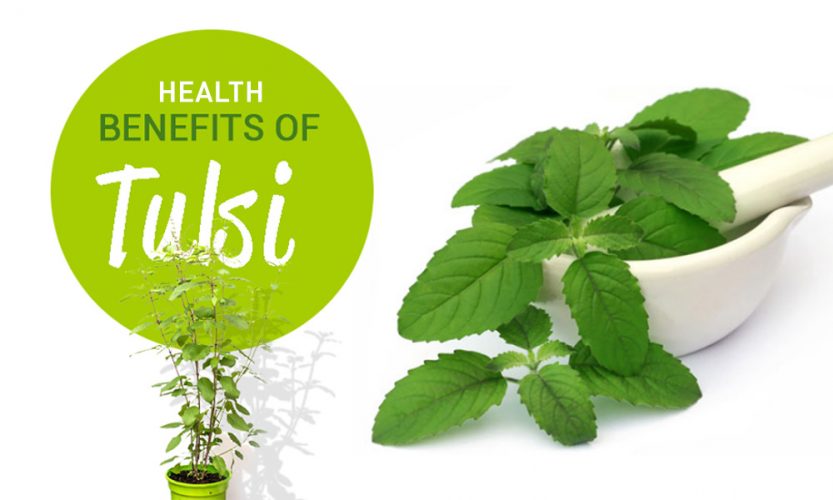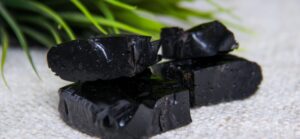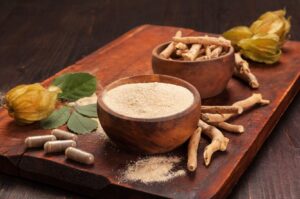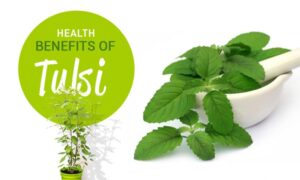Tulsi is a holy plant that has both medicinal and spiritual properties. In Ayurveda, it is known by different names such as “Mother Medicine of Nature” and “The Queen of Herbs”.
Tulsi is beneficial in relieving cough and cold symptoms due to its antimicrobial, anti-inflammatory, antitussive (cough-relieving) and anti-allergic properties. Taking a few leaves of Tulsi along with honey helps relieve cough and flu as it improves immune health. Taking Tulsi tea on a daily basis has a calming effect and helps reduce stress.
According to Ayurveda, Tulsi helps reduce asthmatic symptoms due to its Kapha-balancing property.
Tulsi is also useful in managing ringworm infection. Applying a paste of Tulsi leaves on the affected area helps prevent infection and also relieves inflammation as well as pain
What are the synonyms of Tulsi?
Ocimum sanctum, Holy Basil, Devdundubhi, Apetrakshsi, Sulbha, Bahumanjri, Gauri, Bhutghani, Vrinda, Ared Tulsi, Karitulasi, Gagger chettu, Tulashi, Tulas, Thai basil, Sacred basil, Dohsh, Tulasi, Kala Tulsi, Krishna Tulsi, Krishnamul, Manjari Tulsi, Vishnu priya, St. Joseph’s wort, Suvasa Tulsi, Raihan, Thiru Theezai, Shree Tulsi, Surasa
What is the source of Tulsi?
Plant Based
BENEFITS OF TULSI
What are the benefits of Tulsi for Common cold?
scientificMODERN SCIENCE VIEW Tulsi is a well-known immunomodulatory herb that might improve the individual’s ability to fight against common cold. Tulsi has antimicrobial, anti-allergic and anti-inflammatory properties, therefore prevents the inflammation of the nasal mucous membrane. It also prevents the regular recurrence of the common cold symptoms. Another study states that Tulsi helps gives relief from cough.
ayurvedicAYURVEDIC VIEW Common cold is caused by an aggravation of Kapha and weak digestion. When the food we eat is not fully digested, it changes into Ama. This Ama reaches the respiratory system in the form of sputum and causes cold or a cough. Tulsi has Deepan (appetizer), Pachan (digestive) and Kapha balancing properties which help to reduce Ama and expel the excessive sputum from the body.
Tips to prepare Tulsi Kadha:
- Take 10-12 Tulsi leaves, 1 teaspoon of grated ginger and 7-8 dried kalimirch.
- Boil water in a pan, add Tulsi, grated ginger and kalimirch and boil for 10 minutes.
- Add a pinch of black salt and squeeze ½ lemon to it.
- Let it stand for 1 minute.
- Strain and drink warm to control common cold and cough
What are the benefits of Tulsi for Influenza (flu)?
scientificMODERN SCIENCE VIEW Tulsi acts as an immunomodulator and prevents viral infection. It also has antipyretic and diaphoretic activity, which induces sweating and normalizes elevated body temperature[1][16].
ayurvedicAYURVEDIC VIEW In Ayurveda, influenza is known as Vata Shleshmika Jwara which is due to the imbalance of the three doshas – Vata, Pitta, and Kapha. Tulsi helps manage influenza by balancing all the three doshas especially Kapha dosha by its Rasayana (rejuvenating) properties and helps boost immunity.
Tips to prepare Tulsi Kadha: - Take 10-12 Tulsi leaves, 1 teaspoon of grated ginger and 7-8 dried kalimirch.
- Boil water in a pan, add Tulsi, grated ginger and kalimirch and boil for 10 minutes.
- Add a pinch of black salt and squeeze ½ lemon to it.
- Let it stand for 1 minute.
- Strain and drink warm to manage Influenza symptoms
What are the benefits of Tulsi for Asthma?
scientificMODERN SCIENCE VIEW Tulsi has immunomodulatory activity and prevents the regular recurrence of asthmatic symptoms. It also has anti-allergic and anti-inflammatory properties and reduces the inflammation of the mucous membrane of the bronchial tubes. Tulsi also acts as an expectorant that expels excess mucus from the lungs[1][16].
ayurvedicAYURVEDIC VIEW Asthma is known as Swas Roga and the main doshas involved are Vata and Kapha. The vitiated ‘Vata’ combines with deranged ‘Kapha dosha’ in the lungs causing obstruction in the respiratory passage. This results in gasping and labored breathing. Tulsi has Kapha and Vata balancing properties which help to remove the obstruction and get relief in asthma.
Tip: - Take the juice of Tulsi leaves and mix in 1 teaspoon honey.
- Consume 3-4 times daily
What are the benefits of Tulsi for Fever?
scientificMODERN SCIENCE VIEW Due to its immunomodulatory and antimicrobial property, Tulsi enhances the immune system of the body. Tulsi has an antipyretic and diaphoretic activity that helps to induce sweating and normalizes the elevated body temperature during fever.
ayurvedicAYURVEDIC VIEW The leaves of Tulsi can be used to reduce fever because it helps to improve immunity and fight against infection due to its Rasayana (rejuvenating) property.
Tips to prepare Tulsi Kadha: - Take 15 to 20 Tulsi leaves, 1 teaspoon of grated ginger and 7-8 dried kalimirch.
- Boil water in a pan, add Tulsi, grated ginger and kalimirch and boil for 10 minutes.
- Add a pinch of black salt and squeeze ½ lemon to it.
- Let it stand for 1 minute.
- Strain and drink warm to manage fever.
What are the benefits of Tulsi for Stress?
scientificMODERN SCIENCE VIEW Tulsi is a well-known adaptogenic herb that might improve the individual’s ability to deal with stress. Stress increases the secretion of adrenocorticotropic hormone (ACTH) which in turn increases the cortisol levels (stress hormone) in the body. Eugenol and ursolic acid in Tulsi reduces the level of cortisol and help manage stress and stress-related problems. The immunostimulant capacity and antioxidant property of Tulsi might also contribute to its adaptogenic action.
ayurvedicAYURVEDIC VIEW Stress can usually be attributed to an imbalance of Vata dosha, and is associated with insomnia, irritation and fear. Tulsi has the property of balancing Vata which helps to reduce stress when taken on a regular basis.
Tips to prepare Tulsi Kadha: - Take 10-12 Tulsi leaves and add it to 2 cups of water.
- Boil it in a pan till the volume reduces to half a cup.
- Allow it to cool to room temperature and strain the mixture.
- Add 1 teaspoon of honey and mix well.
What are the benefits of Tulsi for Diabetes?
scientificMODERN SCIENCE VIEW Tulsi might be useful in managing diabetes and diabetes related complications. Studies suggest that Tulsi has hypoglycemic effect and decreases the elevated blood glucose levels by increasing insulin secretion and insulin sensitivity. Tulsi has antioxidant properties, protects the pancreatic cells and also reduces the risk of diabetic complications like impaired liver, kidney and cardiac functions[1][13].
ayurvedicAYURVEDIC VIEW Diabetes also known as Madhumeha is due to an aggravation of Vata and impaired digestion. Impaired digestion leads to an accumulation of Ama (toxic remains in the body due to improper digestion) in the pancreatic cells and impairs the function of insulin. Tulsi helps remove Ama and controls aggravated Vata due to its Deepan (appetizer) and Pachan (digestive) properties. This thus helps control high blood sugar level.
What are the benefits of Tulsi for Heart disease?
scientificMODERN SCIENCE VIEW Tulsi might be useful in preventing stress-related heart diseases. Eugenol and ursolic acid in Tulsi lowers the level of cortisol and help to reduce stress and stress-related problems like heart diseases. Tulsi also has antioxidant property which prevents cardiac lipid peroxidation caused by free radicals. This lowers the risk of heart diseases and helps maintain a healthy heart[15][16].
ayurvedicAYURVEDIC VIEW Increase in cholesterol and blood pressure levels along with a stressful life can increase the risk of heart disease. Tulsi reduces the stress level due to its Vata balancing property and controls high cholesterol due to its Ama reducing nature. Together, it helps prevent the heart diseases.
What are the benefits of Tulsi for Liver disease?
scientificMODERN SCIENCE VIEW Tulsi might be useful in managing viral hepatitis. Tulsi has antiviral, anti-inflammatory and antioxidant properties because of which it protects the liver cells from the damage caused by the virus and free radicals. Therefore, Tulsi not only acts as a hepatoprotective agent but also helps restore the liver functions[1].
ayurvedicAYURVEDIC VIEW Liver disorders are due to an aggravation of the Pitta dosha and poor Pachak Agni (digestive fire). This affects the liver function and later vitiates other doshas as well. Tulsi helps to improve Pachak Agni due to its Deepan (appetizer) and Pachan (digestive) properties and prevent toxin-induced damage of liver cells due to its Rasayana (rejuvenating) nature.
What are the benefits of Tulsi for Malaria?
scientificMODERN SCIENCE VIEW Tulsi is known to have antimalarial activity. Eugenol in Tusli is the main constituent that has mosquito repellent property[1].
What are the benefits of Tulsi for Diarrhea?
scientificMODERN SCIENCE VIEW Not enough scientific evidence is available to support the role of Tulsi in case of diarrhea.
ayurvedicAYURVEDIC VIEW Tulsi manages digestion and gives relief in case of diarrhea by improving the Pachan Agni (digestive fire). It helps in proper digestion of food due to its Deepan (appetizer) and Pachan (digestive) properties and helps control diarrhea.
What are the benefits of Tulsi for Insomnia?
scientificMODERN SCIENCE VIEW Not enough scientific evidence is available to support the role of Tulsi in insomnia.
ayurvedicAYURVEDIC VIEW An aggravated Vata dosha makes the nervous system sensitive which leads to Anidra (insomnia). Tulsi works as a relaxing herb and helps to get a good sleep by balancing the Vata dosha.
How effective is Tulsi?
Insufficient evidence Asthma, Common cold, Diabetes, Diarrhea, Fever, Heart disease, Influenza (flu), Insomnia, Liver disease, Malaria, Stress
PRECAUTIONS WHEN USING TULSI
Advice from Experts
scientificMODERN SCIENCE VIEW 1. Tulsi might prolong the bleeding time. Caution is advised in patients with bleeding disorders or taking drugs that may increase the risk of bleeding. - Although not well studied in human, Tulsi may have anti-spermatogenic (sperm-blocking) and antifertility effects.
Allergy
scientificMODERN SCIENCE VIEW People who are allergic or hypersensitive to Tulsi or its constituents should use Tulsi under a doctor’s supervision.
Breastfeeding
scientificMODERN SCIENCE VIEW Not enough is known about the medicinal use of Tulsi during breastfeeding. Therefore, Tulsi should be taken under medical supervision during breastfeeding.
Patients with diabetes
scientificMODERN SCIENCE VIEW Tulsi may lower blood glucose level in people with diabetes. So it is generally advised to monitor the blood glucose level regularly while taking Tulsi along with anti-diabetic drugs.
Pregnancy
scientificMODERN SCIENCE VIEW Tulsi should be avoided during pregnancy as it may stimulate uterine contractions thereby increasing the risk of abortion[3[9]].
Side Effects
Important
scientificMODERN SCIENCE VIEW Tulsi is possibly safe and well tolerated among most of the people when taken by mouth for a short term.
Important
scientificMODERN SCIENCE VIEW In some people, long-term use of Tulsi may cause side effects like: - Low blood sugar
- Antispermatogenic and anti-fertility effects.
- Prolonged bleeding time
RECOMMENDED DOSAGE OF TULSI
Tulsi Capsule – 1-2 capsules twice a day.
Tulsi Tablet – 1-2 tablets twice a day.
Tulsi Powder – ¼- ½ teaspoon twice a day.
Tulsi Juice – 5-10 ml once day.
Tulsi Drop – 1-2 drops twice a day.
Tulsi Oil – 3-4 drops, 4-5 times a day.
HOW TO USE TULSI - Tulsi Capsules
a. Take 1-2 capsules of Tulsi.
b. Swallow it with water twice daily. - Tulsi Tablets
a. Take 1-2 Tulsi tablets.
b. Swallow it with water, twice daily. - Tulsi Powder
a. Put ¼-½ teaspoon of Tulsi powder on the tongue.
b. Swallow it with water, twice daily. - Tulsi Drop
a. Add 1-2 Tulsi drops to 1 glass of lukewarm water.
b. Drink it 1-2 times a day. - Tulsi Leaves
A. Fresh Tulsi Leaves Daily
i. Take 5-7 fresh raw Tulsi leaves.
ii. Eat the leaves preferably in the morning.
B. Tulsi Tea
i. Add the fresh Tulsi leaves to 1½ cups of water.
ii. Boil on a medium flame for 10 minutes.
iii. Strain the water using a strainer.
iv. Add lemon juice and mix well.
v. Drink warm to get relief from cough and cold.
C. Shah jeera- Tulsi Pani
i. Take half a teaspoon of caraway (Shah jeera) and 5-6 leaves of Tulsi in a glass of water.
ii. Boil this mixture until the quantity reduces to half.
iii. Drink 1 teaspoon of this mixture twice a day until the fever reduces.
D. Tulsi Kadha
i. Take 15 to 20 Tulsi leaves, 1 teaspoon of grated ginger and 7-8 dried kalimirch.
ii. Boil water in a pan, add Tulsi, grated ginger and kalimirch and boil for 10 minutes.
iii. Add a pinch of black salt and squeeze ½ lemon to it.
iv. Let it stand for 1 minute.
v. Strain and drink warm to get rid of cough and cold.
E. Tulsi ka pani
i. Add ½ cup of chopped Tulsi leaves and 2 cups of water in a pan.
ii. Boil for 15 minutes.
iii. Cover with a lid and keep aside for 15 minutes.
iv. Drink this water in the morning and evening for its antibiotic and antioxidant properties.
F. Tulsi ki chutney
i. Add ½ cup of Tulsi leaves and raw mango in a blender.
ii. Now add black salt and sugar according to your taste.
iii. Blend properly to form a paste.
iv. Store in the refrigerator and have it with meals.
BENEFITS OF TULSI
What are the benefits of Tulsi for Ringworm?
scientificMODERN SCIENCE VIEW Due to its antimicrobial activity, Tulsi might be applied locally to manage ringworm infection
ayurvedicAYURVEDIC VIEW Ringworm is known as Dadru in Ayurveda and ringworm with itching and burning sensation is due to an imbalance of Kapha and Pitta dosha. Tulsi helps to control ringworm and itching associated with it due to its Ruksha (dry) and Kapha pacifying properties.
Tip:
- Apply the juice of Tulsi leaves on a regular basis to control ringworm infection.
- Or, take 2-3 Tulsi leaves and crush and mix with coconut oil to make a paste.
- Apply to the affected area 2-3 times a day.
- This paste can be safely used in children with ringworm infections.
What are the benefits of Tulsi for Headache?
scientificMODERN SCIENCE VIEW Not enough scientific evidence is available to support the role of Tulsi in case of headache.
ayurvedicAYURVEDIC VIEW Tulsi helps manage headache due to sinusitis which occurs due to an imbalance of Kapha and Vata Dosha. Tulsi reduces congestion and heaviness in the head associated with sinusitis by balancing both Vata and Kapha dosha.
Tip - Simply add hot water and Tulsi leaves to a large pot.
- Make sure the water is hot and steamy.
- Cover your head with a towel.
- Inhale the steam for 10-15 minutes or until the headache starts to subside.
What are the benefits of Tulsi for Animal bite?
scientificMODERN SCIENCE VIEW Due to its anti-inflammatory, analgesic and antihistamine properties, Tulsi might be useful in treating snake and scorpion bites when applied externally.
ayurvedicAYURVEDIC VIEW Tulsi might help in case of an animal bite due to its Ropan (healing) property.
Tip:
Apply Tulsi paste or oil can on the affected area to heal and prevent infection.
What are the benefits of Tulsi for Ear pain?
scientificMODERN SCIENCE VIEW Due to its antimicrobial, anti-inflammatory and antiallergic property, Tulsi might be useful in reducing the earache associated with any microbial infection or allergic reaction.
How effective is Tulsi?
Insufficient evidence Animal bite, Ear pain, Headache, Ringworm
PRECAUTIONS WHEN USING TULSI
Allergy
scientificMODERN SCIENCE VIEW People who are allergic or hypersensitive to Tulsi or its constituents should use Tulsi under a doctor’s supervision[9].
ayurvedicAYURVEDIC VIEW Tip: - Use Tulsi leaf juice or paste with honey or rose water if your skin is hypersensitive.
- Use Tulsi essential oil by diluting it with coconut oil before applying to the skin due to its Ushna (hot) potency.
RECOMMENDED DOSAGE OF TULSI
Tulsi Juice – 5-10 ml or as per your requirement.
Tulsi Oil – 2-5 drops or as per your requirement.
Tulsi Paste – 2-4 gm or as per your requirement.
Tulsi Powder – 2-5 gm or as per your requirement.
HOW TO USE TULSI - Tulsi Toothpaste
a. Take some Tulsi leaves.
b. Dry them under the sun.
c. Crush and make powder of the leaves.
d. Mix 1 teaspoon of leaves powder with ½ teaspoon of mustard oil.
e. Use it as a toothpaste for brushing the teeth to maintain oral hygiene. - Tulsi Sandalwood Pack
a. Take some Tulsi leaves.
b. Dry them under the sun.
c. Crush and make powder of the leaves.
d. Now take a raw sandalwood stick and rub it intensely against a roller board with few drops of water to form a paste.
e. Now mix the Tulsi leaves with the sandalwood paste.
f. Apply this paste on your head, let it dry and wash with lukewarm water to get relief from a headache.
g. You can also use this paste on the face to control acne. - Tulsi leaves Juice or Paste with Honey
a. Take the juice or paste of Tulsi leaves.
b. Add honey to it.
c. Apply once a day to control acne and scars. - Tulsi essential oil with Coconut oil
a. Take Tulsi essential oil.
b. Add coconut oil to it.
c. Apply on the scalp 1-3 times a week to control dandruff. - Disclaimer
The content is purely informative and educational in nature and should not be construed as medical advice. Please use the content only in consultation with an appropriate certified medical or healthcare professional.





